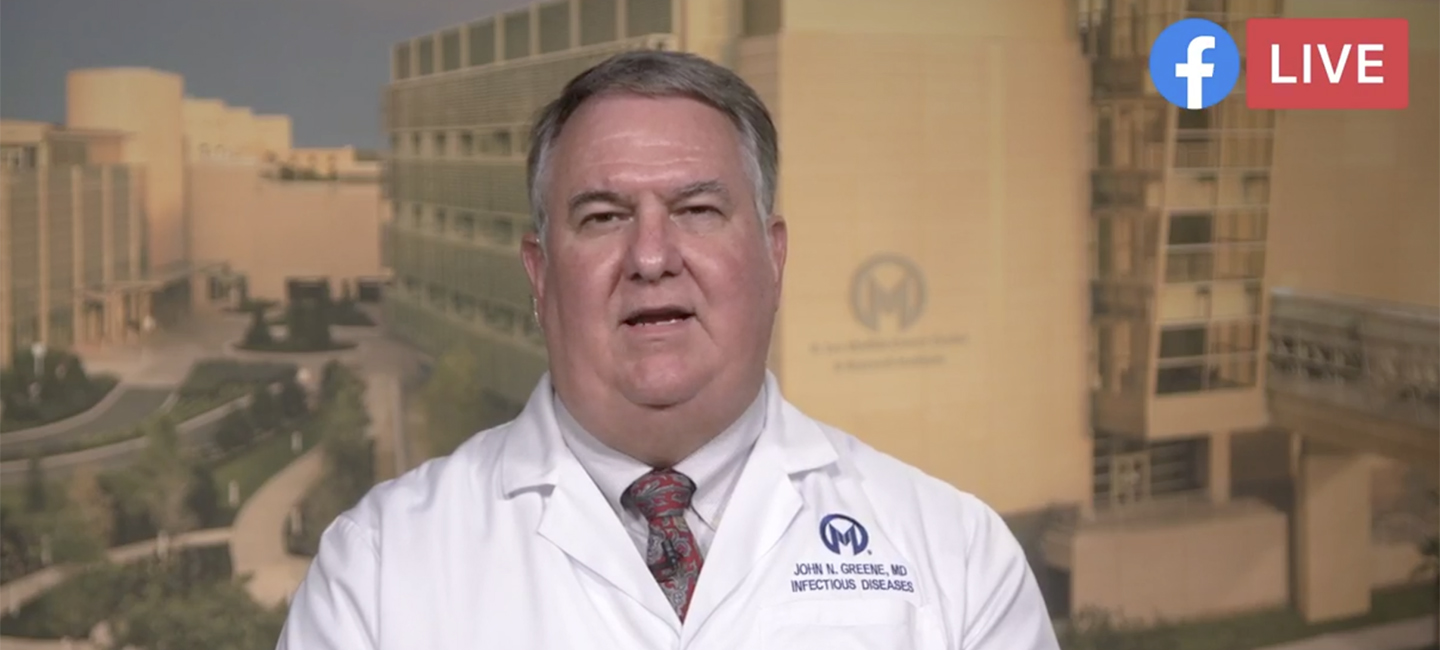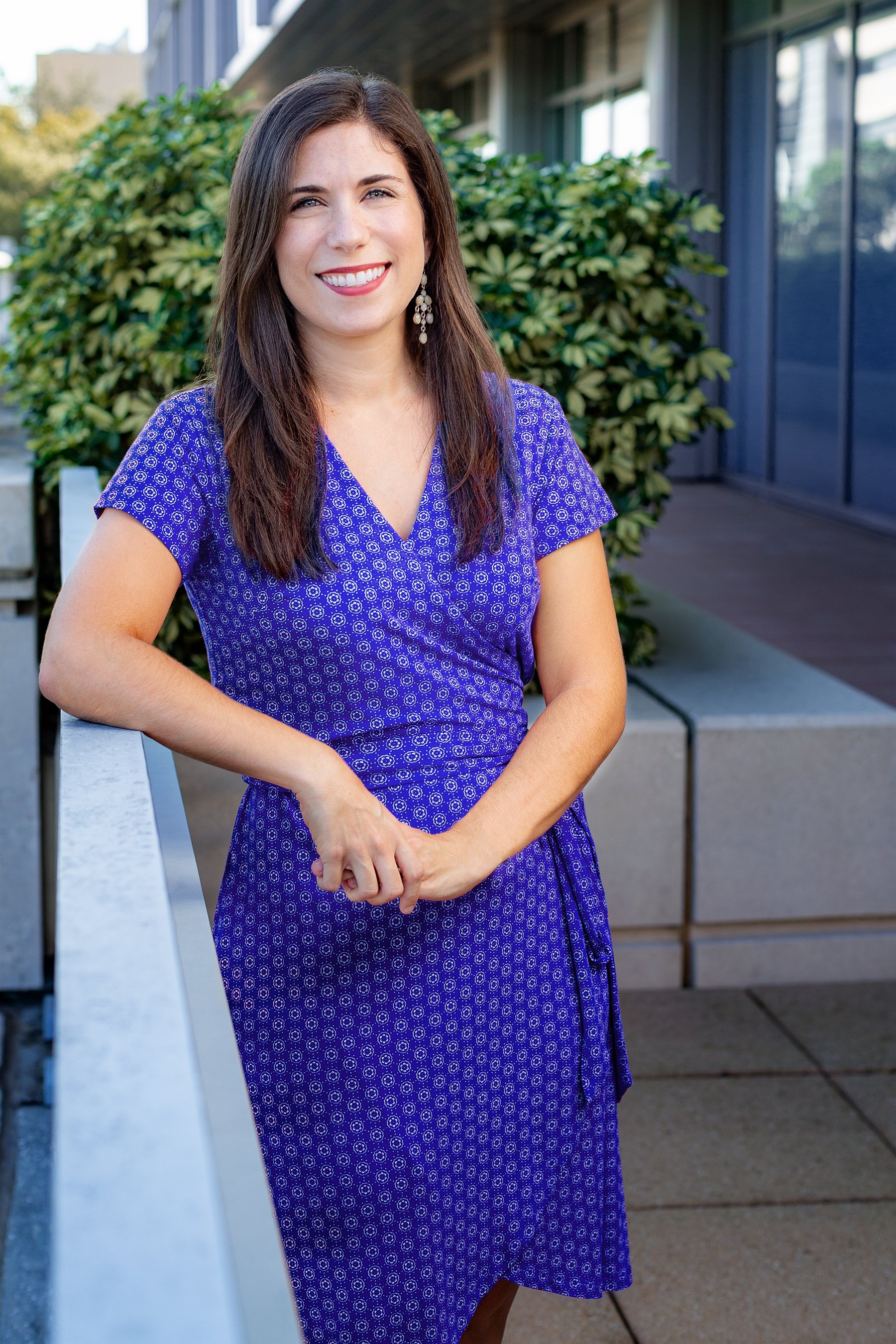Ask the Experts: Your COVID-19 Vaccine Questions Answered
Dr. John Greene, chair of the Infectious Diseases Department at Moffitt Cancer Center, recently connected with our Facebook followers for “Ask the Experts: COVID-19 Vaccine” to answer your questions on the vaccine. Greene was joined by 10 Tampa Bay anchor Allison Kropff.
Here are some abbreviated questions Dr. Greene answered during his interview. Watch the video below for a complete recap of the Facebook Live event.
What can you tell us about the COVID-19 vaccines that are currently approved?
Right now we have the Pfizer and the Moderna vaccines, and these are a type of vaccine called messenger RNA, or mRNA. It is essentially a piece of the virus that makes the spike that sticks onto the human cell. That allows the virus to enter the cell, infect the cell and spread to other people. So when you get the vaccine, it is going into your body and then going to your immune cells. Those cells are then communicating with other cells to make antibodies and also to make memory cells, so that you will have immunity to the virus. So now, if you come into contact with the virus, it will not get into your body because the immune system will stick onto it, kill it and won't let it penetrate into cells and spread to make you very sick.
How safe are these vaccines? Do they change our DNA?
These are very safe vaccines, and they do not incorporate into your chromosomes – your DNA. It just stimulates your immune system to give you an immunity that will last at least eight months. Some experts are saying the vaccine may provide protection up to two years. So at this time, that immunity appears to be stronger and longer lasting than if you caught the virus and developed a natural immunity for three to six months. So, we're really pushing the vaccine to save the most vulnerable from getting a severe illness.
How are these vaccines different from other vaccines?
These vaccines are unique in that they actually are produced in the lab and they take a small piece of the gene of the virus that will then trigger the immune system to attack just a tiny part of the virus from getting into your cells. Whereas with the flu vaccine, they may take a virus and they kill it or injure it. And then they give that dead or attenuated virus to your body. Then it communicates with your immune system so that when your body is introduced to the real live virus, it will attack and keep you from getting infected.
How else have messenger RNA (mRNA) vaccines been used?
They've been used for cancer and HIV research to help your immune system recognize the cancer or a virus such as HIV. Then your immune system kills the cancer, shrinks it or keeps the HIV virus out of your body. So, these messenger RNA vaccines can potentially be used for many different infections and even cancers.
Can the vaccine give you COVID-19?
The vaccine is just a tiny piece of the virus and that piece cannot make a whole new virus particle. So, it's impossible to get a COVID infection from the vaccine. Additionally, after receiving the vaccine it’s not going to appear as positive for COVID-19 through a blood test or nasal swab.

Dr. John Greene, chair of the Infectious Diseases Department at Moffitt Cancer Center
What about mutations and additional strains of COVID-19?
Just like the flu virus rapidly mutates, so does this virus. Eventually we could have some new strains showing up that have mutated enough so that the vaccine is not effective against them; however, that hasn’t happened yet. Since the immune system attacks say 20 different sites of the virus, one mutation will not get rid of the 19 other sites for it to bind and get rid of the virus. Eventually the vaccine may not work if the right mutation happens, and it will no longer be able to bind to that site. Currently, the vaccine seems effective against the initial virus and all the mutations up until now as best we know it.
Why are some people feeling sick after receiving the second dose of the vaccine?
I received the second dose myself last Thursday. I had a little soreness in my arm, but otherwise felt fine. However, keep in mind the vaccine is going to induce a vigorous immune response. And when that is happening in your body, your immune system is cranking out antibodies and other chemicals called cytokines that can result in you feeling fatigue, headache, fever, muscle pain, almost like you have the flu virus. For some people, it's more severe. For others, it may be quite mild. When you’re getting your second dose, it may be more pronounced than the first time because your immune system has had time to recognize the second dose.
How much protection does each dose provide against the virus?
After the first dose, within two weeks, you are making enough immune response to prevent infection 50% to 80%, but closer to 50%. When you get the second dose three to four weeks later, , you will have 95% protection against the COVID-19 virus one week after that dose. Whereas the annual flu vaccine tries to get you protection against four different strains. And the best it can do is about 60% protection. In some years, it's only 40% protection. So compared to the flu, this COVID-19 vaccine at 95% is unheard of.
How long will the vaccine provide immunity?
We know that it will last at least eight months. We haven't had time to tell, but think it's going to last up to a year or maybe even up to two years. Some speculate you'll have to get another vaccine every year just like you do with the flu.
What if I have an allergy to other medications?
Anyone who has other allergies should check with their physician. The CDC looked at over one million vaccines that have been given and found that the chance of a severe allergic reaction called anaphylaxis is 10 times greater than with the flu vaccine. Now that may sound like a lot, but we're talking about 28 people out of a million or more. So, the risk is still low. And most of those people who had an allergic reaction were severely allergic to various other things and they carried an EpiPen, which tells you they're very allergic tendency. If you have a severe enough allergy that you need to carry an EpiPen, then you should check with your physician before getting the vaccine.
If we have already had COVID-19, why do we need to have the vaccine?
What we can tell so far is that many people lose their immune system response within 90 days. There have been very few people who were infected and then within 90 days were re-infected. That's extremely rare. So we feel if you've had COVID infection, you have a window of not getting it again for at least 90 days. After that 90 days, you are susceptible to getting it again. And your immune system, the immune cells and the antibody levels go down over time until it's no longer effective. With the vaccine, your immune response stays higher for longer.
Can someone receiving chemotherapy or immunotherapy get the vaccine?
If you had chemotherapy or immunotherapy and you have cancer or autoimmune diseases, it is recommended that you wait one to two weeks after that because by then your immune system, which was suppressed, can come up enough to respond. Cancer patients who have had a bone marrow transplant have to be three to six months out, otherwise they will have no immune system to respond to the vaccine. It'll be a waste of time for them, but it won't hurt them.
If you are taking medicine like high doses of prednisone for months and months, you may not make an immune response. The worst that can happen is instead of having 95% protection from the vaccine, you're going to have 20% to 60%, which is better than zero. So even if you're immune suppressed, you can get the vaccine. The problem is you may not be fully protected.
Is it safe for pregnant or breastfeeding mothers to receive the vaccine? Can it affect your ability to get pregnant?
Since they haven’t studied it in pregnant women, women who are breastfeeding or those trying to get pregnant, we don't know really know the answer. At first, they would say, just like they say with any vaccine or drug, don't give this to pregnant or breastfeeding women. Well, when we looked at the reality of that, the American College of Obstetrics Gynecology, the CDC and many other groups, all say pregnant women have a higher risk of getting severely ill and dying from this infection. Therefore, they should get the vaccine even though we don't know exactly how it will do in pregnancy. There is also no evidence that revving up your immune system for this virus is going to make you unable to get pregnant. And if you're breastfeeding, there's no evidence that any part of the vaccine can get into breast milk and cause some kind of bad reaction in the child.
How can I be sure that a second dose will be available for me after receiving the first?
We were ensured by federal and state governments that when we received vaccine, we will get enough to cover the second doses of those who we have given the first.
Can you receive one dose of Moderna and one Pfizer or vice versa?
The FDA says if you got Pfizer, get Pfizer for the second dose. If you got Moderna, get Moderna for the second dose. So that's what we're doing.
Can you get the flu vaccine and the COVID-19 vaccine?
You should wait two weeks between each vaccine. If you get flu, you should wait two weeks before the COVID-19 vaccine. Or if you get the COVID-19, you need to wait until the second dose, then two weeks later you can get the flu shot. We definitely still recommend you get the flu vaccine. And talking about the flu and other viruses, normally they're way up this time of year. However, flu season is at an all-time low because everybody is wearing a mask and social distancing. And all the other viruses are very low too. What will happen when we stop social distancing and wearing masks – the flu and other viruses are going to come back and then COVID will join them and we'll see how the future goes from there.
For more information about the COVID-19 vaccine, please visit Moffitt.org/COVID19.



